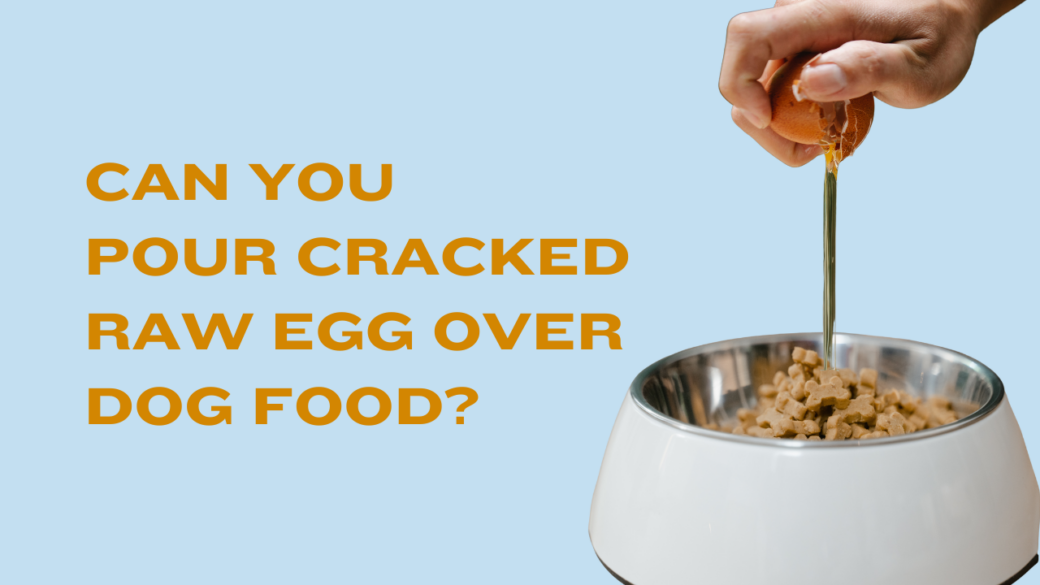Providing a nutritionally balanced diet is part of being a responsible dog owner. This can help support the dogs through their lives, ensuring they are healthy and strong, from puppies to seniors. With this in mind, some pet parents will begin to wonder what they can add to their dogs’ meals to provide essential nutrients. One such addition is raw eggs.
Many dog owners will be used to adding cooked eggs to their dog’s meals; this is popular with young puppies to ensure they receive more calories and with dogs that have upset stomachs. However, using raw eggs might be a foreign concept to many. If you’re reading this, you might be wondering whether adding a cracked raw egg over dog food is beneficial.
Yes, you can add raw egg over dog food. This can boost a dog’s health by providing essential fatty acids, protein, and other minerals and vitamins. There are some risks to this, though; it can cause dogs to become unwell from possible contaminants and bacteria. To find out more, continue reading.
In this article, the benefits and risks of using a raw egg in a dog’s meal will be explored, as well as the best ways to do so. This will hopefully help pet owners become more informed about providing a varied diet for their dogs.
Table of Contents
Can Dogs Eat Raw Eggs?
Yes, most dogs can eat raw eggs. Adding an egg to dog food not only entices the canine to its dinner, but it will also benefit the dog nutritionally. This is the case for both cooked and raw eggs, although it can be argued that eggs lose some nutrients during the cooking process.
However, there are risks to feeding dogs raw eggs and not all dogs will enjoy the taste of raw eggs. Some dogs will even have intolerances to eggs, so it is best to introduce raw eggs into their diet slowly. If dogs are not introduced to this new food over a period of time, they may experience diarrhoea, reduced appetite, regurgitation, and vomiting.
Dogs that are already fed a raw diet will find the addition of raw eggs easier to deal with as their digestive system will be familiar with the bacteria and such.
Cooked vs Raw: Which is More Nutritious for Dogs?
As previously mentioned, when eggs are cooked, they can lose some nutritional value. This doesn’t mean that cooked eggs offer no health benefits, just slightly less. A raw egg will contain antioxidants, healthy fats, minerals, vitamins, and more, and most are easily absorbed into the dog’s digestive system. These nutrients are mainly found in the egg yolk; the egg whites mostly contain protein.
Protein is actually one aspect where cooked eggs come out on top. Eggs that have been cooked can actually provide more protein than raw eggs; the protein is more easily absorbed from a cooked egg.
How to Include Raw Eggs in Your Dog’s Diet
If you choose to feed your dog raw eggs, there are several ways to include raw eggs in a dog’s food. In most cases, the easiest way of feeding raw eggs to dogs is by cracking the egg over dog food. This can be done whether the dog is fed dry or wet commercial dog foods or a raw food diet.
You can pour cracked raw egg over dry dog food, wet food, or raw meat, using either the whole egg or smaller portions of the egg. This is purely a personal choice, depending on your dog’s diet and the quantities it eats. Chicken eggs can be too large for some smaller dog breeds, so using quail eggs might be a better option.

But if you are wary of feeding your dog raw eggs, use lightly scrambled eggs instead. This is commonly used as a bland food when pets experience upset stomachs or are poorly as it provides them with most of the nutrients they require. Boiled chicken is another good option to settle a dog’s upset stomach.
Benefits of Feeding Your Dog Raw Eggs
Although there are benefits to feeding dogs raw eggs, these benefits are similar to those of dogs eating cooked eggs. However, it is still beneficial to understand why feeding a dog eggs can boost their health.
Eggs are an Excellent Source of Protein
Eggs are rich in protein, and protein is required to keep a dog healthy. They contain essential amino acids, which are one of the essential nutrients that eggs contain. Amino acids are crucial for forming muscle tissue, producing immune cells, and releasing enzymes and hormones.
Although protein absorption might be stronger when eggs are cooked, a raw egg will still provide high levels of protein.
Raw Eggs May Help Keep Your Dog’s Coat Shiny and Healthy
If you add raw egg to the dog’s regular food, there will be cosmetic changes to the dog’s body, primarily producing a healthy coat and skin. This is due to the biotin eggs contain, which improves skin condition. Eggs also contain vitamin E, which helps to reduce skin inflammation, and sulfur, which boosts coat growth.
Eggshells Contain Minerals that Promote Joint and Bone Health
Made of calcium, eggshells can help grow and heal bones. This is even more important for puppies and pregnant or lactating dogs. The calcium will promote muscle contraction, nerve function, and strong teeth, as well as healthy bones in dogs.
Even the eggshell membranes can be useful. For dogs with arthritis, the eggshell membranes can improve joint function and reduce joint pain that has been caused by inflammation.
Topping Food with Eggs Can Encourage Dogs to Eat More
As well as benefitting the dog’s health, eggs can also help a dog become a healthy weight. Sometimes, a dog owner will be concerned with how little their dog eats, and adding a cracked raw egg over their dog’s food could encourage the dog to eat more.
Risks of Feeding Your Dog Raw Eggs
Unlike cooked eggs, there are several risks when feeding raw eggs to dogs. Eggs that have been safely cooked are less likely to cause the dog to become ill as the harmful bacteria are eliminated.
Raw Eggs May Contain Salmonella
Although dogs have strong digestive systems that can handle things humans cannot, salmonella is still a risk when feeding raw eggs. Salmonella can cause dogs to experience gastrointestinal disease, ranging from nausea to diarrhoea and vomiting. This can be spread to humans through an infected dog’s faeces, saliva, and/or vomit.
To avoid adding contaminated raw eggs to your dog’s food, you should buy fresh eggs from farms with organic, free-roaming chickens. This can help to reduce the risk of dogs eating raw foods carrying harmful bacteria. Storing the eggs correctly will also prevent bacteria growth.
Egg Whites Contain Avidin
Avidin, which is found in egg whites, is a biotin inhibitor. Biotin, one of the B vitamins, is vital for dogs’ cellular growth, fatty acid production, and healthy skin and coats. For female dogs that are pregnant or lactating, biotin is even more important. There are concerns that too many egg whites will cause a dog to develop a biotin deficiency, but the risk of this is relatively small.
As long as the dog consumes the entire egg, its biotin levels should not be affected. Egg yolks are high in biotin, and there are other sources of biotin, like liver, that the pet might eat regularly.
Raw Eggs May Contain E. Coli
Similar to salmonella, there is the risk of raw eggs being contaminated with E. coli. This bacteria can cause the same sickness as salmonella, such as abdominal pain, diarrhoea, nausea, and vomiting. Again, this can be passed to humans who come into contact with the faeces, saliva, or vomit of an infected dog.
Where you buy the eggs should be considered carefully to ensure they come from healthy chickens, but eggs should also be stored properly. When storing eggs, ensure they are kept below 20 degrees Celsius.
Eggshells May Pose a Choking Hazard to Dogs
Unfortunately, the eggshells can cause dogs to choke. In some cases, they can even cause oral injuries. Preparing the eggshells correctly is important to minimise these risks. Dog owners should grind the eggshells down or use a blender so no shards are left that might hurt the dog’s mouth. Before feeding a dog eggshells, they should be crushed or blended to resemble a powder.
Dogs Can Develop an Egg Allergy
Dogs can suffer from egg allergies at times. These allergies usually stem from the proteins found in eggs; however, this isn’t always the case. An egg allergy has common symptoms relating to digestive issues, like diarrhoea, excessive wind, and vomiting, and skin problems, such as bald patches, hives, and scratching. Anaphylactic shock can also occur, but this is rare.
If you suspect your dog is allergic to eggs, stop feeding both cooked and raw eggs. You will also want to contact your veterinary practice for professional advice and treatment.
Extra Calories in Eggs Could Lead to Your Dog Becoming Overweight
Feeding a dog too many eggs can cause weight gain. This is because eggs are loaded with healthy fats and proteins. To avoid your dog becoming overweight, use moderation when feeding your dog eggs, no matter if they are cooked or raw.
Eggs might not be the best treat for obese dogs but talk to your vet to understand your dog’s diet requirements.
Cracked Raw Egg Over Dog Food: FAQs
With a better understanding of pouring cracked raw egg over dog food, pet owners can make more informed decisions on their dogs’ diets. There are benefits and risks to adding raw eggs to a dog’s food, and you might have further questions on the topic. Additional questions and answers have been provided below:
Are eggshells safe for dogs?
Yes, eggshells are generally safe for dogs to consume. The eggshells are a good source of essential amino acids, calcium, chondroitin, and glucosamine. It is well-known that calcium is a key component in healthy bone and teeth formation, which can help dogs throughout their lives.
Only eggshells from trustworthy sources should be given to dogs, though, as most supermarkets sell chemically treated eggs.

Should dogs eat whole or crushed eggshells?
To avoid the risk of choking, eggshells should be crushed before serving to dogs. Some dogs will manage to eat the whole egg, but preparing the shells will reduce the risk of contamination and choking; it will also give the owner peace of mind.
Can you give raw eggs for a dog’s itchy skin?
Raw eggs can help to soothe itchy skin in dogs. Eggs contain high levels of omega-3 fatty acids, which can nourish a dog’s skin and contribute to a shiny coat. This can lessen the skin’s dryness and itchiness.
However, if the dog continues to suffer from itchy skin, it is best to seek veterinary advice, as they might prescribe medication.
Can I give my dog a raw egg every day?
On average, one egg contains 60 calories, so it is best to avoid giving dogs raw eggs daily. This will also depend on the dog’s activity levels, age, breed, health, and size. There are calculators available online, like this one, that will analyse how many calories your dog should eat per day.
To get feeding guidance tailored to your dog, contact a local vet who can advise you on how much your dog should be eating.
To Sum Up
Adding raw eggs to a dog’s diet is beneficial; still, these benefits are similar to using cooked eggs. Of course, when you cook eggs, some of the nutrients will be lost, which is why some people believe giving raw eggs to dogs is the better option. There is a lot of debate over which is more nutritious.
However, from reading this article, you will have learned eggs that have been cooked are also generally safer than raw. In some instances, adding a raw egg to a dog’s food can increase the animal’s risk of consuming harmful bacteria like salmonella and E. coli, which can make them poorly and even spread to humans. This is why dog owners should do their research and even contact their local veterinary practices before changing their dogs’ diets.
To put it simply, yes, you can add a cracked raw egg over dog food, but there are risks to keep in mind.
Disclaimer: This article is for informational purposes only and should not be used as a substitute for professional veterinary advice.

